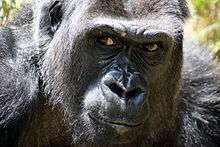primate
See also: Primate
English
WOTD – 29 March 2016

Pronunciation
- IPA(key): /ˈpɹaɪmeɪt/
Audio (US) (file) Audio (AU) (file) - Hyphenation: pri‧mate
Noun
primate (plural primates)
Hyponyms
- See also Thesaurus:primate
Translations
mammal
|
Etymology 2
From Old French primat, from a noun use of Latin primat-, from primus (“prime, first rank”). Compare English primus, of similar derivation and meaning. [circa 1200]
Noun
primate (plural primates)
- (ecclesiastical) In the Catholic Church, a rare title conferred to or claimed by the sees of certain archbishops, or the highest-ranking bishop of a present or historical, usually political circumscription.
- (ecclesiastical) In the Anglican Church, an archbishop, or the highest-ranking bishop of an ecclesiastic province.
Derived terms
Derived terms
- Primate of All England
- Primate of England
- Primate of the Gauls
Translations
archbishop or bishop
|
French
Pronunciation
- IPA(key): /pʁi.mat/
Further reading
- “primate” in le Trésor de la langue française informatisé (The Digitized Treasury of the French Language).
Italian
Related terms
- primati (mammals) (plurale tantum)
- primato (primacy)
This article is issued from
Wiktionary.
The text is licensed under Creative
Commons - Attribution - Sharealike.
Additional terms may apply for the media files.